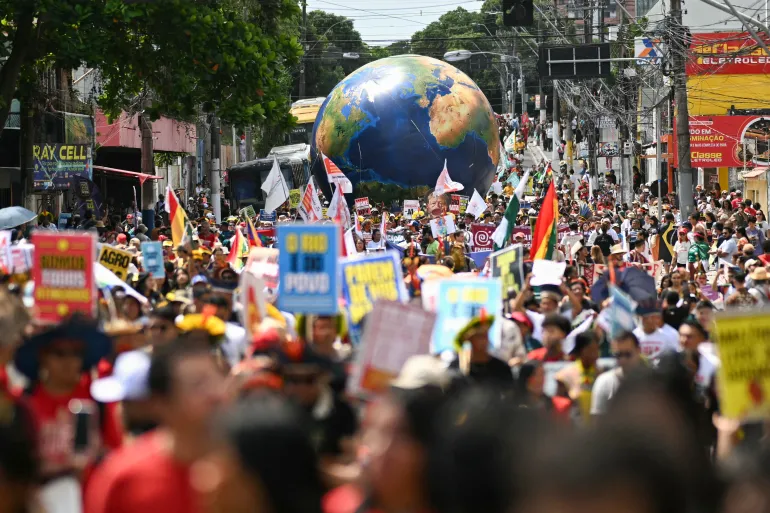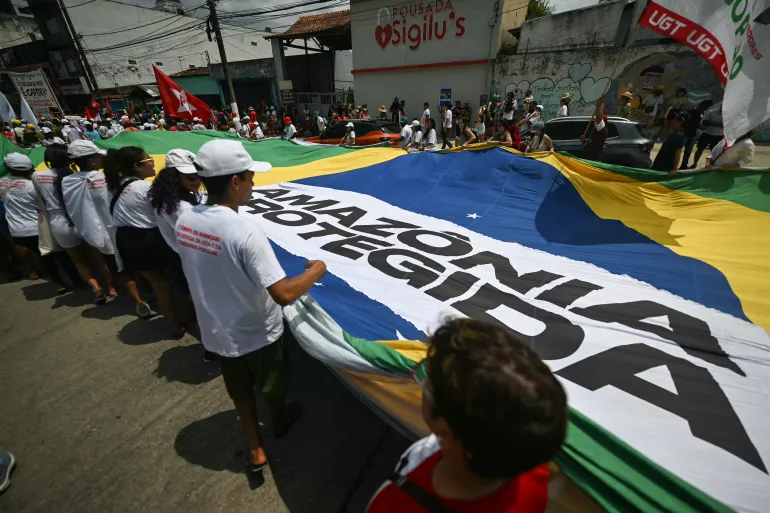Indigenous and other climate activists say they need to ‘make their voices heard’ as UN conference hits halfway mark.
Published On 15 Nov 2025
Thousands of people have marched through the streets of the Brazilian city of Belem, calling for the voices of Indigenous peoples and environmental defenders to be heard at the United Nations COP30 climate summit.
Indigenous community members mixed with activists at Saturday’s march, which unfolded in a festive atmosphere as participants carried a giant beach ball representing the Earth and a Brazilian flag emblazoned with the words “Protected Amazon”.
Recommended Stories
list of 3 itemsend of list
It was the first major protest outside the conference, which began earlier this week in Belem, bringing together world leaders, activists and experts in a push to tackle the worsening climate crisis.
Indigenous activists previously stormed the summit, disrupting the proceedings as they demanded that Brazilian President Luiz Inacio Lula da Silva take concrete action to ensure their territories are protected from growing threats.
Amnesty International warned in a recent report that billions of people around the world are threatened by the expansion of fossil fuel projects, such as oil-and-gas pipelines and coal mines.
Indigenous communities, in particular, sit on the front lines of much of this development, the rights group said.

Branded the “Great People’s March” by organisers, Saturday’s rally in Belem came at the halfway point of contentious COP30 negotiations.
“Today we are witnessing a massacre as our forest is being destroyed,” Benedito Huni Kuin, a 50-year-old member of the Huni Kuin Indigenous group from western Brazil, told the AFP news agency.
“We want to make our voices heard from the Amazon and demand results,” he said. “We need more Indigenous representatives at COP to defend our rights.”
Youth leader Ana Heloisa Alves, 27, said it was the biggest climate march she has participated in. “This is incredible,” she told The Associated Press. “You can’t ignore all these people.”
The COP30 talks come as the UN warned earlier this month that the world was on track to exceed the 1.5C (2.7F) mark of global warming – an internationally agreed-upon target set under the Paris Agreement – “very likely” within the next decade.
If countries do as they have promised in their climate action plans, the planet will warm 2.3 to 2.5C (4.1 to 4.5F) by 2100, a report by the UN Environment Programme (UNEP) found.
“While national climate plans have delivered some progress, it is nowhere near fast enough, which is why we still need unprecedented emissions cuts in an increasingly tight window, with an increasingly challenging geopolitical backdrop,” said UNEP chief Inger Andersen.
Despite that urgency, analysts and some COP30 participants have said they don’t expect any major new agreements to emerge from the talks, which conclude on November 21.
Still, some are hoping for progress on some past promises, including funding to help poorer countries adapt to climate change.
